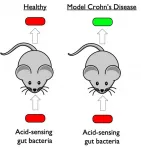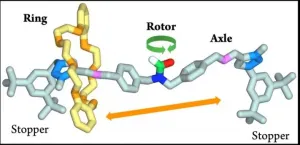(Press-News.org) Dapagliflozin, a sodium-glucose cotransporter 2 (SGLT2) inhibitor, did not significantly reduce the risk of organ failure or death or improve recovery in patients hospitalized with COVID-19 who are at high risk of developing serious complications compared to placebo, according to data presented at the American College of Cardiology's 70th Annual Scientific Session. The researchers, while acknowledging the results were not statistically significant, said they were encouraged by the lower numbers of organ failure and deaths observed in patients treated with dapagliflozin and by favorable safety data.
COVID-19 can lead to multi-organ failure, especially in patients at high risk for severe illness and complications. The Dapagliflozin in Respiratory Failure in Patients with COVID-19 (DARE-19) trial was the first phase III randomized, controlled clinical trial that was initiated to determine whether dapagliflozin could reduce cardiovascular, kidney and respiratory complications or all-cause death and improve recovery (dual primary endpoints), in patients acutely ill and hospitalized with COVID-19.
Dapagliflozin is an SGLT2 inhibitor that was initially developed as a medication to lower blood sugar levels in patients with Type 2 diabetes, but clinical studies have since demonstrated that it also has significant cardiovascular and kidney benefits, regardless of diabetes status.
"We already know that SGLT2 inhibitors provide organ protection in patients with Type 2 diabetes, heart failure and chronic kidney disease, and these are the exact same patients who if they contract COVID-19 are at high risk to be hospitalized with serious illness and develop complications, such as organ failure," said Mikhail Kosiborod, MD, cardiologist at Saint Luke's Mid America Heart Institute, vice president for Research at Saint Luke's Health System in Kansas City, Missouri, and the study's principal investigator. "Accordingly, we wanted to see if dapagliflozin may also help with organ protection in patients with cardiometabolic risk factors who are acutely ill and require hospitalization due to COVID-19."
A total of 1,250 patients admitted with COVID-19 at 95 sites in the U.S., Brazil, Mexico, Argentina, India, Canada and the U.K. between April 2020 and January 2021 were included in the trial. Patients, who also had risk factors for developing serious complications, including high blood pressure, diabetes, atherosclerotic vascular disease, heart failure or chronic kidney disease, were randomized 1-to-1 to dapagliflozin (10 mg) or placebo once daily. Patients started the treatment as soon as possible (and no later than four days following hospital admission) and continued the treatment for a total of 30 days, even if they were discharged from the hospital. Neither the patient nor the clinician or study personnel knew which treatment patients were receiving.
At 30 days, organ failure or death--one of the study's primary endpoints--occurred in 11.2% of patients who were treated with dapagliflozin and 13.8% of patients treated with placebo. Altogether, 6.6% of patients in the dapagliflozin group died during study follow-up versus 8.6% in the placebo group.
Kosiborod said that for every component of organ failure or death endpoint--respiratory, cardiac, kidney failure or death from any cause--the results appeared to be directionally favorable for dapagliflozin as compared to placebo; however, because they did not reach statistical significance, further study is needed.
"Our study generates a hypothesis that dapagliflozin may offer organ protection in acutely ill patients who are hospitalized with COVID-19, but we were not able to prove this beyond a reasonable doubt because patient outcomes rapidly improved during the study period, making it much harder to accrue enough events and reach statistical certainty," Kosiborod said.
Rapid improvements in the standard of care for patients hospitalized with COVID-19 between spring and summer of 2020 resulted in substantial declines in the number of patients with organ failure or death, he explained. For example, the mortality rate in patients hospitalized with COVID-19 in the U.S. decreased from approximately 25% to 5% between April and August of 2020.
The second primary endpoint of recovery, driven mostly by time to hospital discharge, was similar between patients taking dapagliflozin and placebo. Of importance, dapagliflozin was well-tolerated, with no new safety issues identified.
"There were concerns at the beginning of the pandemic about the safety of SGLT2 inhibitors in patients hospitalized with COVID-19, and some groups were recommending discontinuation of these medications in this setting, even in individuals with chronic conditions in which they have known benefits, such as Type 2 diabetes and heart failure. Everyone was doing their best to make recommendations for what they felt was the safest approach in a data-free zone at that time," Kosiborod said. "Our findings show that dapagliflozin is well-tolerated in patients hospitalized with COVID-19, with no new safety issues being observed. This should have implications for clinical practice given that our results do not support discontinuation of SGLT2 inhibitors in this setting, as long as patients are monitored."
Overall, there were numerically fewer serious adverse events in patients receiving dapagliflozin versus placebo, researchers reported. Two non-severe cases of diabetic ketoacidosis were observed in the trial, both in the dapagliflozin group and in patients with prior history of Type 2 diabetes.
"Our study opens the door to asking additional questions," Kosiborod said. "The idea for DARE-19 was quite unorthodox when we started--everyone was concentrating on antivirals and anti-inflammatory drugs, so it is fascinating to hypothesize that SGLT2 inhibitors may provide organ protection in acute illness. This should inform future clinical science and hopefully lead to further investigations."
INFORMATION:
Additional data for 90-day follow up of these patients is still being evaluated. DARE-19 was funded by AstraZeneca.
Kosiborod will be available to the media in a virtual press conference on Sunday, May 16, 9:45 a.m. ET / 13:45 UTC.
Kosiborod will present the study, "Effects of Dapagliflozin on Prevention of Major Clinical Events and Recovery in Patients with Respiratory Failure due to COVID-19 - Main Results from the DARE-19 Randomized Trial," on Sunday, May 16, at 8 a.m. ET / 12:00 UTC, virtually.
ACC.21 will take place May 15-17 virtually, bringing together cardiologists and cardiovascular specialists from around the world to share the newest discoveries in treatment and prevention. Follow @ACCinTouch, @ACCMediaCenter and #ACC21 for the latest news from the meeting.
The American College of Cardiology envisions a world where innovation and knowledge optimize cardiovascular care and outcomes. As the professional home for the entire cardiovascular care team, the mission of the College and its 54,000 members is to transform cardiovascular care and to improve heart health. The ACC bestows credentials upon cardiovascular professionals who meet stringent qualifications and leads in the formation of health policy, standards and guidelines. The College also provides professional medical education, disseminates cardiovascular research through its world-renowned JACC Journals, operates national registries to measure and improve care, and offers cardiovascular accreditation to hospitals and institutions. For more, visit ACC.org.
Media Contacts
Nicole Napoli
202-669-1465
nnapoli@acc.org
Thy-Ann Nguyen
703-479-3642
thyann.nguyen@curastrategies.com
Older patients hospitalized with acute heart failure who participated in a novel 12-week physical rehabilitation (rehab) program tailored to address their specific physical impairments had significant gains not only in physical functioning but also quality of life and depression compared with those receiving usual care, regardless of their heart's ejection fraction, according to a new study presented at the American College of Cardiology's 70th Annual Scientific Session. Participation in the program, however, did not significantly reduce rehospitalizations during the six-month follow up.
Heart failure, which ...
Taking medications to protect the heart from damage associated with adjuvant breast cancer therapy--medications that are administered in addition to surgery to remove a tumor--did not significantly improve markers of heart health two years after breast cancer treatment, according to a study presented at the American College of Cardiology's 70th Annual Scientific Session.
The researchers reported no significant differences between patients who took an angiotensin receptor blocker (candesartan cilexetil) or a beta-blocker (metoprolol succinate) compared with placebos in terms of left ventricular ejection fraction (LVEF), a measure of the heart's ability to effectively pump ...
Rivaroxaban, in addition to low-dose aspirin, significantly reduced the occurrence of total severe events of the heart, limb or brain and issues related to other vascular complications in patients with symptomatic peripheral artery disease (PAD) who underwent lower extremity revascularization, a procedure to open blocked arteries in the leg. The findings, presented at the American College of Cardiology's 70th Annual Scientific Session, expand on earlier data and underscore the broad absolute benefits of this strategy in this high-risk patient population, researchers said.
"To our knowledge, this is the first time that the addition of low-dose rivaroxaban to aspirin has been clearly shown to reduce ...
In patients who had a coronary stent inserted after experiencing the most severe type of heart attack, the use of a technique that measures blood flow and pressure through a partially blocked artery to determine if a second stenting procedure is needed did not improve outcomes and was more costly than using angiography, or a heart X-ray, alone to guide the procedure, according to research presented at the American College of Cardiology's 70th Annual Scientific Session.
"The strategy of using fractional flow reserve (FFR) to guide the stenting procedure is not superior to the standard technique of using angiography to treat additional partially blocked arteries," said Etienne Puymirat, MD, professor of cardiology at the University of Paris, director of intensive care at the Georges ...
HOUSTON - (May 17, 2021) - In an important step toward the clinical application of synthetic biology, Rice University researchers have engineered a bacterium with the necessary capabilities for diagnosing a human disease.
The engineered strain of the gut bacteria E. coli senses pH and glows when it encounters acidosis, an acidic condition that often occurs during flareups of inflammatory bowel diseases like colitis, ileitis and Crohn's disease.
Researchers at the University of Colorado (CU) School of Medicine used the Rice-created organism in a mouse model of Crohn's disease to show acidosis activates a signature set of genes. The corresponding ...
Humans leave their "footprints" on the land area all around the globe. These land-use changes play an important role for nutrition, climate, and biodiversity. Scientists at the Karlsruhe Institute of Technology (KIT) combined satellite data with statistics from the past 60 years and found that global land-use changes affect about 32 percent of the land area. This means that they are about four times as extensive as previously estimated. The researchers publish their findings in the scientific journal Nature Communications.
Whether it is deforestation, urban growth, agricultural expansion, or reforestation - land-use changes are diverse and have ...
Researchers from Tohoku University have developed a new numerical method that paves the way for simulating landslide tsunamis.
Their research was published in the journal Computational Mechanics on May 13, 2021.
Landslides occurring on land or underneath the sea - known as subaerial and submarine landslides respectively - can cause devastating tsunamis. They also pose other hazards such as severing submarine cables and pipelines.
Yet the mechanisms at play behind these landslides are less well understood, partly due to the multifaceted interactions taking place: a collapse of the seabed and/or the interaction between soil and water. Conventional approaches make it difficult to ...
Clinics that mailed mifepristone and misoprostol tablets to patients during the pandemic have experienced a high demand and have been able to safely screen and care for patients via telehealth, according to two studies recently published online in the journal Contraception.
The first study identifies factors that supported the provision of abortion pills across four healthcare settings. Factors that contributed to success included clinic staff helping to organize the telehealth appointment and to distribute pills, the first paper noted, as well as already having telehealth ...
Doctors often recommend Omega-3s to help patients lower their cholesterol and improve heart health. Those Omega-3s can come from fatty fish like salmon and mackerel, or supplements that often contain a combination of the acids eicosapentaenoic acid (EPA) and docosahexaenoic acid (DHA).
Now, new research from the Intermountain Healthcare Heart Institute in Salt Lake City finds that higher EPA blood levels alone lowered the risk of major cardiac events and death in patients, while DHA blunted the cardiovascular benefits of EPA. Higher DHA levels at any level of EPA, worsened health outcomes.
Results of the Intermountain study, which examined nearly 1,000 patients over a 10-year-period, will be presented virtually at the ...
Gears and mechanical transmissions are at home in the Emilia-Romagna region, the Motor Valley of northern Italy. A team of researchers from the University of Bologna and the Institute for Organic Synthesis and Photoreactivity of the National Research Council (Cnr-Isof) in Bologna, led by Massimo Baroncini and Alberto Credi, has planned, constructed and operated NanoGear, a device consisting of interlocked molecular components and designed to function as a gear. Since molecules are nanometric objects (1 nanometer = 1 millionth of a millimetre), it is an exceedingly small device: certainly, ...



